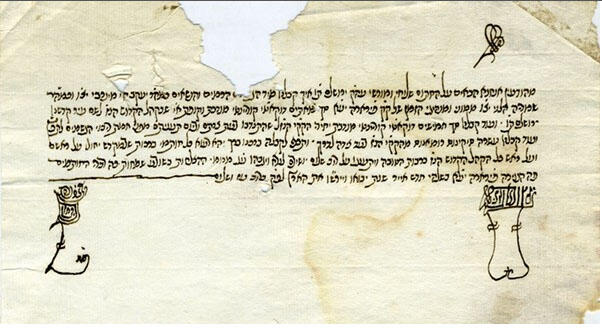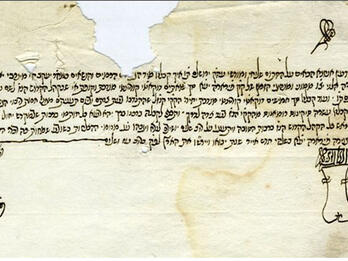Kedushat Yom Tov (The Sanctity of Yom Tov)
Section 8
Reuben spoke in the marketplace with two men, inviting them to come to his house for the purpose of giving them the monies accrued from a business partnership, and they entered his house together, and from there they went in after him to the house of his neighbor, in the belief that he would give them the monies in his neighbor’s house. Now when they entered into the house together, there was a young girl, a virgin, there, engaged in her work. And Reuben spoke up and said to these two men: “You, Mr. So-and-so, and you, Mr. So-and-so, be witnesses!” And he instantly seized the hand of the young girl and said to her: “Behold! You are betrothed to me with this ring,” etc. And the witnesses were alarmed at the sight of this, and astounded, and they turned around forthwith and departed from the house, with Reuben likewise following them outside. But as for the young girl, she was seized with a fit of trembling, and she called to her relatives and told them: “Thus and thus did this man do to me!” And her relatives began to cry out regarding these things, and summoned the witnesses before the ecclesiastical court to testify as to what had occurred; and the witnesses stood and testified before the ecclesiastical court, swearing by their own lives and by their Jewish faith that the matter was as follows: that they had not known what was in the mind of Reuben, and thought that it had genuinely been on account of the money that they had been brought [to Reuben’s, and subsequently, to his neighbor’s house]; that when they had entered the house of his neighbor, the idea had already dawned on them that Reuben had some business dealings with his neighbors, both those of high and of low rank; and they had mentally concluded that it was from the house of his neighbor that he wished to take the money and give it to them. Moreover, when he had said: “You, Mr. So-and-so, and you, Mr. So-and-so, be witnesses!” they had thought that he wished to get them to testify concerning himself—that he had received the money from the young girl; but that when he took hold of the girl’s hand, he did so with force, and the young girl had wept and snatched her hand away, and he had grabbed it with force. The ecclesiastical court further enquired of the witnesses as to whether any words exchanged between Reuben and the young girl had taken place earlier, either in connection with the betrothal or concerning some other subject, and they testified, by way of totally formal evidence, that no words whatsoever had been previously exchanged between them, but rather, as soon as he had entered the house and said to the witnesses: “Be witnesses!” he had taken hold of the hand of the young girl and had said to her: “Behold! You are betrothed,” etc. They further testified, by way of totally formal evidence, that they had not seen the transferal of the ring from his hand to her hand, and that they did not know with what object he had betrothed her; merely that they had heard, from his mouth, that he had said to her: “Behold! You are betrothed,” etc. They testified, in addition, by way of totally formal evidence, that they had left the house forthwith and that they did not know whether the young girl had instantly thrown down the ring from her hand, while he was saying the words, or not. All this was attested to by the witnesses. Now, they are inquiring as to whether or not this betrothal has any validity, and they further say that in regard to this type of matter, there is a consensus of the rabbis of the early generations to the effect that one ought not to effect a betrothal other than in the presence of ten Jewish men, two of whom should be from among the distinguished members of the community, and that the local rabbi, responsible for the dissemination of Torah, should be overseeing them. And it is stated there as follows: “Any man who acts presumptuously, to betroth a woman with two witnesses present, but who does not have with him at that ceremony ten Jewish men, as aforementioned, such betrothal shall not be binding and shall have no force, and it shall be treated as the dust of the earth, and as something without substance; as for the money which he gave to the woman for the purpose of effecting a betrothal, we hereby declare it to be entirely ownerless, by virtue of the valid power of the ecclesiastical court invested in us; and we render his betrothal entirely null and void, with the same power as the ecclesiastical court of Ravina and Rav Ashi, who possessed the power to confiscate people’s money.” Now since this man Reuben transgressed this consensus, it remains to be considered whether or not any account is to be taken of the betrothal effected by him. [ . . . ]
A Festival for the Rabbis
[ . . . ] The supreme virtue of the Land of Israel is well known, and in particular, the supreme virtue of Jerusalem the Holy City—which is possessed of the very utmost virtue; and in the Gemara there exists a difference of opinion as to whether the original sanctity of Jerusalem created a state of sanctity both for its own time and for the future too, and Rabbi Moses [Maimonides] has explained, in chapter 6 of the halakhot relating to the Temple, [in his work Mishneh Torah] that the original sanctity of the Holy Temple and of Jerusalem created a state of sanctity for its own time and for the future too, that therefore we may offer up all the various sacrifices there notwithstanding the fact that the Temple has not yet been rebuilt, that we may eat the most holy of the offerings throughout the Temple court even though it lies in ruins, that we may eat those offerings enjoying a minor degree of holiness, and the second tithe, throughout the whole of Jerusalem although it has no surrounding walls, as its original state of sanctity created a state of sanctity both for its own time and for the future too. He provided a reason as to why, in the case of the Temple and of Jerusalem, their original state of sanctity created a state of sanctity for the future, whereas, in regard to the sanctity of the remainder of the Land of Israel—insofar as the Sabbatical year and tithes and other matters of a like nature are concerned, it did not create any sanctity for the future. Namely, that the sanctity of the Temple and of Jerusalem came about on account of the divine presence there, and the divine presence can never be canceled, and scripture indeed states: “And I shall make your sanctuaries desolate”—upon which verse the Sages declared: “Despite their being desolate, they still remain in their state of sanctity”—but those obligations imposed upon the land in the Sabbatical year, and in connection with tithes, are applicable only by virtue of a public conquest of the Land having occurred. Once the Land had been taken away from them, that conquest became null and void, and the Land was exempted, by virtue of the law of the Torah, from the obligations of giving tithes and resting during the Sabbatical year, since it was no longer the Land of Israel; but when Ezra came up and sanctified it a second time, it became sanctified both for its own time and for the future as well. Accordingly, the sanctity of Jerusalem and of the Temple experienced no interruption, for the initial sanctity whereby Jerusalem was sanctified by the descendants of those who came up from Egypt, and the sanctity of the Temple, which was sanctified in the days of King Solomon, never ceased, despite their having been exiled and the Temple having been destroyed—unlike the rest of the territory of the Land of Israel, where their sanctity ceased with the first exile, until such time as Ezra came up from Babylon and sanctified it, both for his own times and for the future. And the essential reason for this distinction is that the sanctity of the Temple and of Jerusalem existed because the divine presence resided there, and the divine presence never departed from there, even when they were destroyed, as is stated in Canticles Rabbah, section 282, where it is written as follows: “Another explanation: ‘The divine presence never departed from the midst of the Temple, as it is stated in scripture: And My eyes and My heart shall be there for eternity.’” And we find, in similar vein, the verse: “And He has answered me from His holy mountain. Selah!” Hence, although it is a mountain that now lies in ruins, it remains in its original state of sanctity. And moreover, come and have a look at what is written in regard to the proclamation of Cyrus: “He is the God Who is in Jerusalem.” He was in effect saying to them: “Even though it lies in ruins, the Almighty God has not departed from there.” Moreover, said R. Aha: “The divine presence has never departed from the Western Wall, as it is stated: Behold, He is standing behind our Wall!” The Midrashic citation concludes at this point.
Credits
Published in: The Posen Library of Jewish Culture and Civilization, vol. 6.






